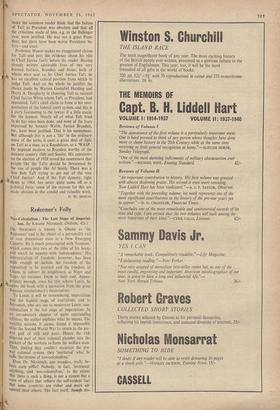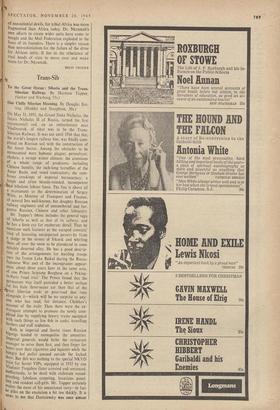Redeemer's Folly
Neo-Colonialism : The Last Stage of Imperial- ism. By Kwame Nkrumah. (Nelson, 42s.)
DR. NKRUMAH is known in Ghana as 'the Redeemer' and is the object of a personality cult of rare dimensions even in a New Emerging Country. He is much preoccupied with 'freedom,' Which comes into two of the titles of his books and which he equates with 'independence.' His interpretation of freedom, however, has been Wide enough to .include the freedom of the Opposition to be arrested and the freedom of Ghana to subvert its neighbours, as Niger and Togo, for instance, know to their cost. Appro- priately enough, since his title echoes Lenin, he opens the book with a quotation from the great Russian revolutionary's Imperialism.
To Lenin, it will be remembered, imperialism was the highest stage of capitalism; and to Nkrumah, who sets out to modernise Lenin, neo- colonialism is the last stage of imperialism. In an introductory chapter of quite outstanding silliness, the author explains what he means. The Wealthy nations, it seems, found it impossible after the Second. World War to return to the pre- War gulf of rich and poor. Hence the rich diverted part of their colonial plunder into the Pockets of the workers to Vorm the welfare state. Then, finding they couldn't maintain the pre- War colonial system, they 'instituted' what he calls 'the-system of neo-colonialism.'
Does Dr. Nkrumah, one wonders, really be- lieve such piffle? Nobody, in fact, 'instituted' anything; and 'neo-colonialism,' to the extent that there is such a thing, is not a system but a state of affairs that reflects the self-evident fact that some countries are richer and more ad- vanced than others. The fact itself, though dis-
tressing to the less developed (or 'developing,' as the euphemism has it), has remarkably little to do with colonialism, imperialism or neo- colonialism. Liberia, for instance, was a less advanced country after more than a century of independence than Ghana after a comparable period of dependence. Ah yes, Dr. Nkrumah would say, but Liberia• was neo-colonialised by the Firestone Corporation. So what? Why did Siam, which escaped colonisation, remain under- developed while Japan, which also did. bounded ahead to become one of the great industrial coun- tries of the world?
Dr. Nkrumah gives much of his space to a catalogue of the giant companies operating in Africa, whose size and interlocking connections he appears to find sinister. But size is a neces- sary condition of investment in the risky business of mineral extraction, and interlocking is a logical safeguard against collapse. These things are less important than the fact that without the energy and enterprise of the great companies, much of Africa would remain the economic desert it was when Rhodes rode into the Matopo hills.
Nor is the fragmentation of Africa the work of neo-colonial devils, for tribal Africa was more fragmented than Africa today. Dr. Nkrumah's own efforts to create wider units have come to nought and the Mali Federation exploded in the faces of its founders. There is a simpler reason than neo-colonialism for the failure of the drive for African unity. It lies in the reluctance of rival heads of state to move over and make room for Dr. Nkrumah.
BRIAN CROZIER




















































 Previous page
Previous page